Let’s address the elephant in the room right up front. Anyone who saw Stan’s post-match interview with outstanding Chiefs No.8 Luke Jacobsen will know what I mean when I say his hands were never far from the ball all night.
The list of power loose forwards who visit Canberra and consign Rob Valetini to bit-player status is a very short one. Jacobson, however, was in beast mode from the get-go, scoring an outrageous solo try, repeatedly busting through contact and, alongside Sam Cane, leading a compelling defensive effort.
Don’t be fooled by the 31-21 scoreline; as hard as the Brumbies tried, there was daylight between the two sides in terms of cohesion and defensive organisation, with ladder positions one and four accurately reflecting where the two sides now sit.
A 12-Test All Black, Jacobson, strong all season, laid down a marker that should have Shannon Frizell, Cullen Grace, Hoskins Sotutu and Akira Ioane shaking in their boots, with the international season looming and hard selection calls to be made.
But, oh boy, that interview. Maybe next time Stan can give him two microphones; to keep both hands occupied.
Not just laying down a marker, but writing his name onto the World Cup team-sheet in bold, all-black Texta was Mark Telea, whose four tries kept the Blues out in front of the Hurricanes, 36-25.
Among Telea’s strengths is his insatiable appetite for work, frequently popping up in midfield or the opposite wing, always sniffing out the ball, looking for an opportunity to make something happen.
None of the tries were gift wrapped, Telea earned them all, with the last an exquisite piece of skill; sliding forward on the slippery surface, able to scoop up the ball backwards, before planting it over the try-line. Outstanding.
Telea’s timing was all the more significant given the news this week that Leicester Fainga’anuku, the player whose exit from last year’s end-of-season-tour provided Telea his All Blacks’ opportunity, was heading to France at the end of this season.
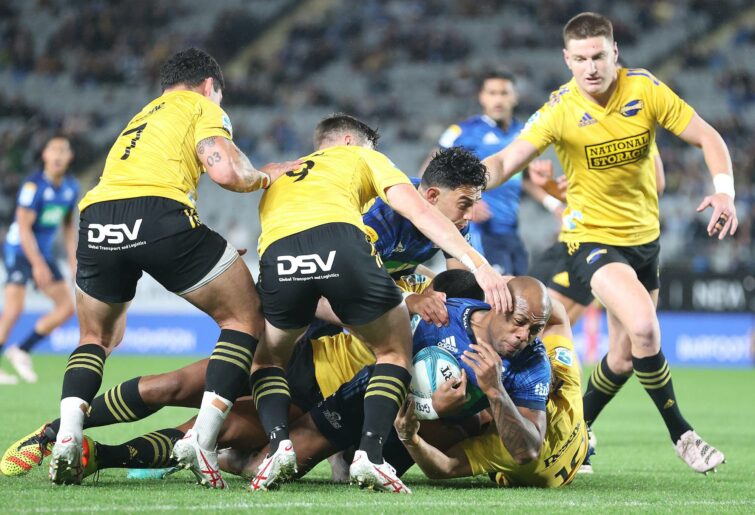
(Photo by Phil Walter/Getty Images)
Both NZ Rugby and Rugby Australia have done well in recent weeks to confirm a number of re-signings for next season and beyond; a task always made more difficult in the year of a World Cup.
But gone are the days of Australia’s ‘Giteau Law’, or the odd player sabbatical or ‘pension year’, being sufficient levers to keep players in Super Rugby.
Eddie Jones, for example, looks likely to be afforded licence to pick the players from overseas competitions who he thinks will win the World Cup, whether that be three, five, or more.
And while it is true that some players are moving the other way, the equation is far from balanced. Fainga’anuku out for the Crusaders? John Afoa in. Trouble is, Fainga’anuku is 23, with the world in front of him; Afoa is 39, now with the distinction of being the oldest man ever to play Super Rugby.
In Melbourne, it’s Matt Philip and Trevor Hosea out; the blow somewhat softened – but not really – by Lukhan Salakaia-Loto returning from Northampton.
What’s particularly galling for the Rebels is that the injured Philip has sat out almost all of this season, while Hosea missed all of last year. What everyone recognises as a high-quality locking combination – something to build a franchise around – has in fact never been such. And, it seems, never will be.
All of this of course, is the continuation – acceleration – of rugby’s global commercial forces conspiring to re-allocate labour (players and coaching IP) to where salaries are the highest.
It was difficult enough when France and England were the ‘culprits’, but with Japanese clubs now offering non-capped players like Hosea the opportunity to secure both he and his parents a house, it’s a tough time to be a Super Rugby franchise CEO or coach.
What Super Rugby has always had, and still does, is a remarkable ability to uncover exciting new talent. And no matter the bleating about Super Rugby being “dead” or “boring” – which mostly comes from people who don’t actually watch it – the quality remains, for the most part, high.
That said, the need to keep Super Rugby fresh and relevant has never been more acute. This is the reason why levels of angst remain high on both sides of the Tasman, around delays in the formation of an independent commission to operate and promote the competition.
Despite what you might read, the inability to move this forward is not due to any New Zealand versus Australia stand-off. There is eagerness and uniform agreement across both countries awaiting final board assent; code for Rugby Australia chairman Hamish McLennan deciding whether he can stomach ceding power and attention, or not.
Run up the chairman’s flagpole last week was the smokescreen that such a commission would potentially add a needless layer of bureaucracy. Well, perhaps, but only if Rugby Australia and NZ Rugby design it and operate it that way.
Rome may not be burning, but it is smouldering. The Emperor might do well to stop fiddling.
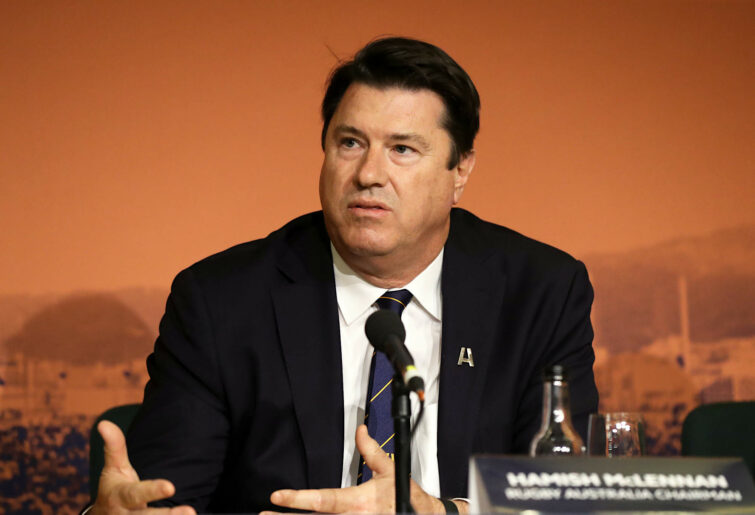
(Photo by Oisin Keniry – World Rugby/World Rugby via Getty Images)
For the second week running the Highlanders conjured a last-minute win, albeit this time scoring a try to edge out the Reds, 35-30. Surely the Highlanders’ best player across their existence, the delight etched onto Aaron Smith’s face was palpable; for his team, and for his protégé, Folau Fakatava, tricking Fraser McReight into vacating his blindside ruck post.
The loss of a match they clearly had the winning of hurts the Reds immeasurably, dropping them from seventh to also-ran status. With their two captains injured, every last element of the heroics on show in New Plymouth a fortnight ago will be needed in Suva this weekend if they are to qualify for the finals.
There was disappointment and frustration directed at the returning Hunter Paisami for a costly 79th-minute fumble, but closer examination uncovers bigger failings. The five tries conceded by the Reds had in common an alarming softness, with only the fourth to Connor Garden-Bachop coming from a multi-phase build-up (and a blatant forward pass not picked up by referee Brendan Pickerill).
Two were from first phase off a 5m linout and 5m scrum respectively. Another came off a 10m lineout, and Fakatava’s final effort, from second phase off a 20m scrum, was yielded far more easily than what the situation demanded.
Reds No.8 Harry Wilson caught the eye with some impressive ball running, but his ineffective tackle on prop Saula Ma’u for the third try, absorbing the hit and falling backwards over the try-line instead of meeting Ma’u assertively with a hard shoulder, is unlikely to escape the attention of Eddie Jones and Wallabies defence coach Brett Hodgson.
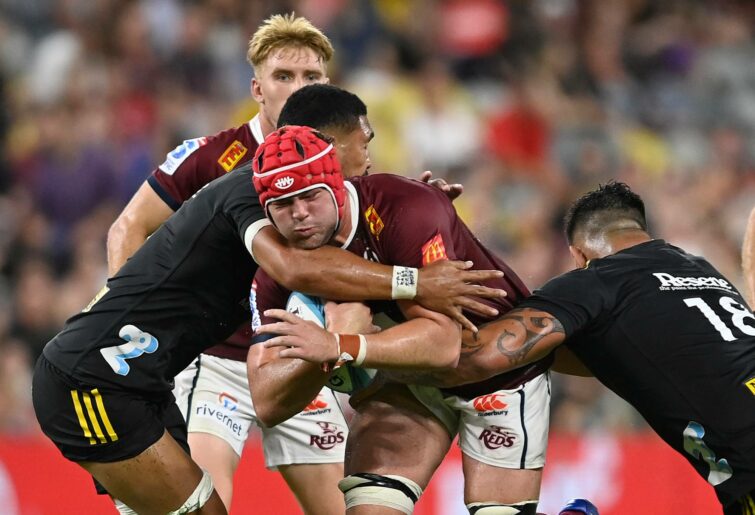
(Photo by Ian Hitchcock/Getty Images)
This column has been vocal about the lack of situational awareness and the stubborn refusal of players to recognise the value of quick turnover ball from which to launch long-range attacks. And so, it was a case of chickens coming home to roost in the 77th minute when, under sustained attack from the Highlanders, the ball unexpectedly fell to Reds prop Sef Fa’agase in the defensive 22.
Recognising an opportunity under knock-on advantage, Jock Campbell began to sweep around Fa’agase into where he could see space. One pass and Campbell would have been off in counter-attack, with the option to run, call in his winger or, if cornered, kick deep into Highlanders’ territory.
Fa’agase’s instinctive reaction, however, was to duck his head straight back into contact, where the ball was duly spilled. Yes, the scrum was the Reds’ feed, because of the first knock-on but, now faced with an under-pressure exit from their own goal-line, instead of using Campbell to exit on the front foot, on his own terms, that was no victory at all. Unless your name happened to be Smith, Fakatava or Dermody.
Whatever happens in Canberra this Friday night, it’s hard to understate how important the Rebels’ 52-14 demolition of the Force on Friday night is to their program. Having threatened to make the transition to ‘good side’ many times during the season, what has been missing is a complete 80-minute performance.
Although far from perfect, this outcome represents the difference between players, instead of hoping that their true potential can be unlocked, knowing that, when they get the balance right, it actually can.
For the Force, the popular theory that they remain well placed to qualify for the finals as a result of the Chiefs wrapping up top seed and subsequently resting players this weekend, feels more like wishful thinking than anything convincing.
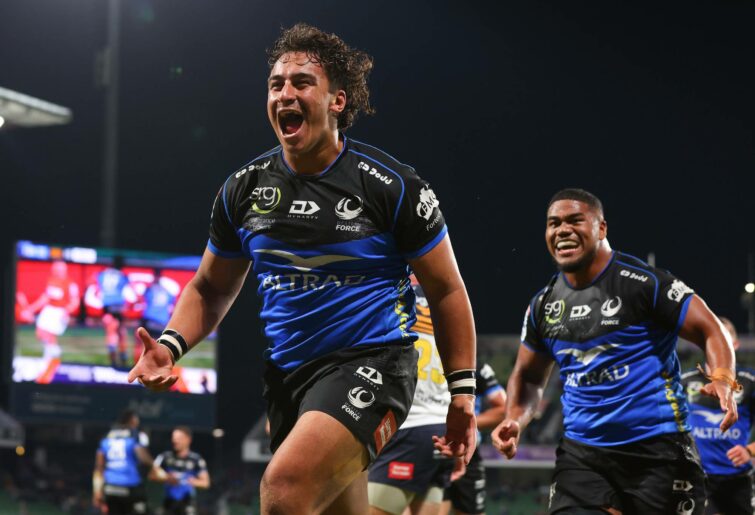
(Photo by James Worsfold/Getty Images)
For one, the Chiefs are already on tour, and the prospect of a special charter flight being arranged to ferry club players from Hamilton to Perth is highly unlikely.
The more pressing factor for Force coach Simon Cron is that with leading props Santiago Medrano and Tom Robertson out of commission, he has to find a scrum that doesn’t concede metres and/or penalties. The sight of the Rebels jogging the Force scrum over 20 metres backwards – sparking a spectacular break by halfback Ryan Louwrens and a 95m try for Lachie Anderson – is the stuff of coaching nightmares.
At least outgoing Moana Pasifika coach Aaron Mauger is just a week away from no longer having to endure any more coaching nightmares; his side falling agonisingly short in Lautoka 47-46, after a final-minute conversion from Christian Lealiifano hooked wide of the posts.
As the score suggests, this was a confounding match, some glorious attack triumphing over some woeful defence, with the athletic Drua centre, Iosefo Masi, scoring his seventh, eighth and ninth tries of the season, putting himself in the conversation with Jacobsen and Telea for player of the round.
With Lealiifano almost as unconvincing from the tee as Jordie Barrett was in Auckland, there was a pre-ordained sense of foreboding about the final stanza; that Moana Pasifika, trailing by six points, would use their lineout maul to score a try, but that they would leave themselves asking too much of their kicker.
This had echoes of the Rebels fumbling the finish of their recent match against the Brumbies. It feels harsh to criticise a side yet to win a match for not managing a pressure-filled situation with ruthless composure, but it’s as if teams have to go through this kind of pain first, in order to learn how to win. In this case, it was imperative Moana Pasifika’s final lineout maul be set on a path towards the goalposts, to secure the try and the conversion.
Instead, replacement hooker Samiuela Moli sheared off to the left; still close enough, it must be said, for a player of Lealiifano’s experience to get the job done, but in retrospect, leaving Moli knowing that a little more patience and clear thinking would have won them the match.
The story out of Christchurch wasn’t the result – nobody would be surprised by the Crusaders 42-18 win over the Waratahs – but the injuries suffered by Max Jorgensen, Cullen Grace and David Havili. Let’s hope things aren’t as bad as what a couple of them looked.
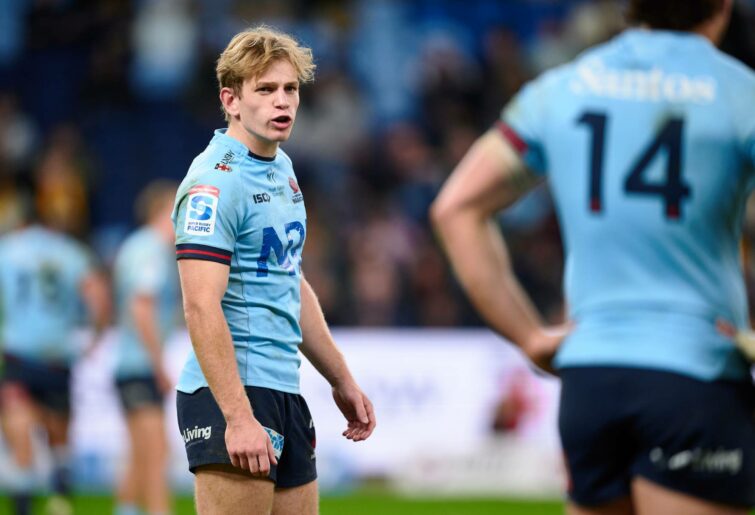
(Photo by Brett Hemmings/Getty Images)
To finish this week with a conundrum for Eddie Jones and the enigma that is Brumbies fullback Tom Wright. Wright has enjoyed a strong season and started off Saturday night’s match with an incisive clean line-break. But there are defensive concerns that can’t be ignored.
Late in the match, Wright was beaten on the outside swerve by Chiefs replacement halfback Cortez Ratima. Ratima’s try was ultimately overturned as a result of illegal play by Brodie Retallick, but nonetheless, the point stands.
This season, Wright has been skinned on the outside for tries by Blues flanker Tom Robinson, Rebels flanker Josh Kemeny, and now, Ratima. I’d wager Wright would easily have all three covered in a straight foot-race, yet his positioning, timing and decision-making seems askew.
It’s a tough gig, defending in the last line. Angles and relative speeds must be inherently understood and precisely processed. Commit too early and you get stepped on the inside. Too late, or lacking explosive speed off a standing start, and you risk conceding ground and an angle you can’t make up.
Test rugby is won at the margins. Wright won’t always have the luxury of having Marika Koroibete sweeping up behind him, performing heroic deeds in the corner.
Jones and Hodgson have an interesting challenge ahead of them: is the question of Tom Wright a coaching, or selection matter? Whatever they decide, it feels like a proper fix is required, not just a fiddle.

































































































